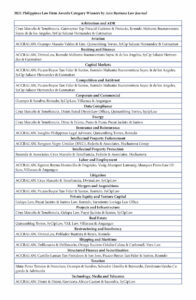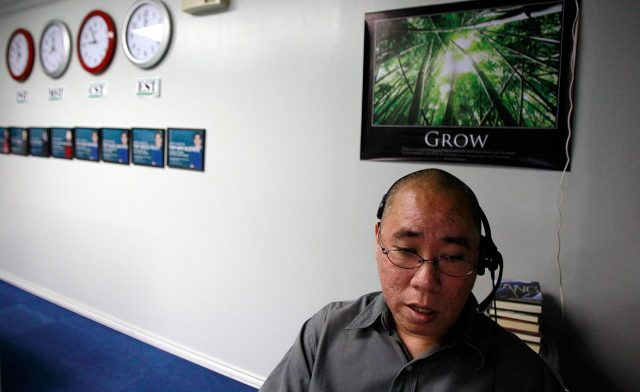Gorriceta Africa Cauton & Saavedra (Gorriceta)
By Adrian Paul B. Conoza, Special Features Assistant Editor
It usually takes decades to build a legacy in the Philippine legal industry — an industry that heavily depends on long-term client relationships, consistent exemplary services rendered, and leading expertise in the multitude of legal fields. And yet, defying odds, within seven years from its inception, Gorriceta Africa Cauton & Saavedra (Gorriceta) already propelled itself as among the top-tier full-service law firms in the country, moreso claiming undisputed leadership in a hotly contested field of law — Technology, Media, and Telecommunications (TMT).
When Gorriceta started in 2015, it heavily focused on Corporate, Capital Markets, Mergers & Acquisitions, Taxation, Intellectual Property, and Litigation Law, which Gorriceta’s managing partner, Atty. Mark S. Gorriceta, noted are relatively traditional practice areas for any Manila-based law firm.
“This has allowed the firm to build its initial set of clients and foster a culture of excellence amongst its founding team of lawyers,” Mr. Gorriceta told BusinessWorld in an e-mail.
Later on, Gorriceta expanded to Anti-Trust and Competition, Project Development and Finance, Labor and Employment, Real Estate, Infrastructure and Special Projects, Immigration, Data Privacy & Cybersecurity, Banking and Financial Services, and of course, TMT Law.
Key to its fast-paced growth is its relentless and driven team of legal professionals which, as Atty. Gorriceta described, “on average, are young, tech-savvy, and agile in adopting and spearheading legal developments to meet innovations in the market” as led by its current nine partners, three junior partners, and seven counsels.
Gorriceta’s remarkable growth is easily validated by its numerous recognitions by reputable legal ranking institutions here and abroad.
Leading its trophy cabinet is its three-year reign (2019, 2020, & 2021) as the top TMT Law Firm in the Philippines recognized by Asia Business Law Journal in its annual Philippines Law Firm Awards. Gorriceta has also been awarded for three consecutive years (2019, 2020 & 2021) as the TMT Law Firm of the Year by Asian Legal Business, a Thomson Reuters company.
Since 2017, when it won as Rising Law Firm of the Year, Gorriceta has steadily increased its nominations and wins in the Philippine Law Awards, bagging Innovative Law Firm of the Year (2019 and 2021), Construction and Real Estate Law Firm of the Year (2020), Data Privacy and Protection Law Firm of the Year (2021), Philippine Deal Firm of the Year (2021), and Equity Market Deal Firm of the Year (Midsize) (2021), among others.
Atty. Gorriceta was also awarded as Managing Partner of the Year in 2020 and Dealmaker of the Year in 2021 in the Philippine Law Awards. The Legal 500 also names Gorriceta as among its recommended Philippine firms in the Capital Markets, Mergers & Acquisitions, TMT, Intellectual Property, Dispute Resolution, and Labor and Employment.
With TMT as its current legal centerpiece, Atty. Gorriceta’s open secret is the firm’s “heavy investment and expansion in TMT projects, by engaging both stakeholders: from regulators, to startups, to the general public in developing TMT as an instrument of public good.”
“We have built strong links with the TMT and FinTech space — whether globally or locally, private or governmental — in order to have firsthand knowledge of the new technologies that could be brought into or developed within the Philippine market,” Mr. Gorriceta explained. “In turn, [as we open ourselves to] discovering and/or familiarizing ourselves with such new technologies, we bridge regulators and private stakeholders into applicable Philippine laws and regulations that allow for the creation of entities or structures that can roll out these new products and services.”
This has been a winning formula, with heavyweights in the Philippine TMT space adorning its roster of clients, such as: UnionBank, UBX, Coins.PH, GCash, Kumu, Shopee, ShopeePay, Robinsons Group, Filinvest Group, Multisys Technologies, Angkas, and Foodpanda. It also holds an expansive list of up-and-coming startups and organizations that rely on the firm for Philippine legal and regulatory advice in the TMT/fintech space.
As part of its professional responsibility, Atty. Gorriceta continued, the firm also assists legislators and government regulators in developing and upgrading existing laws and regulations to meet the demand for innovative products and services that are potentially of great benefit to the public — such as the open finance ecosystem, the rise of blockchain-based technologies, and many others, thus acting as a key mediator at the crossroads of innovation and regulation.
“We have assisted traditional business clients in developing a tech and/or fintech arm to bridge their products and services into the growing digital economy. We have also facilitated several Securities and Exchange Commission (SEC) and Bangko Sentral ng Pilipinas (BSP) license applications that have enabled the expansion of much-needed financial services in the country, which in turn, propelled more business growth for our clients,” Atty. Gorriceta said.
Beyond its leadership in the TMT space, Gorriceta has also solidified its track record in equity market deals and closed notable mergers and acquisitions that continue to change the business landscape in the country. Its all-around legal services have also been heavily tried and tested during the pandemic, emerging triumphantly when the firm saw “an exponential increase in legal services rendered.”
Yet, with such an expansive reach and steady leadership, Gorriceta remains hungry for new opportunities.
“The firm is now looking to expand to energy law in order to assist the energy sector and the country with the ever-pressing demands for energy regulation, project development for renewable and non-renewable energy, electric generation and transmission, and various other environmental law concerns,” Atty. Gorriceta said. To realize this, it has further boosted the number of its legal professionals and invested heavily on further legal training and development, particularly in this new journey towards Energy Law.
While Gorriceta acknowledges that its legacy in the Philippine legal industry remains young and suspect to an unfathomable set of future challenges, it remains optimistic that these challenges can be met by a culture of perseverance, dedication to legal excellence, and a penchant for finding and developing the right lawyers that are driven to make a mark for themselves.













